Who is here? 1 guest(s)
|
Tachinidae - Compsilura concinnata (not Clemelis)
|
|
| eklans |
Posted on 28-09-2023 12:02
|
|
Member Location: Posts: 3337 Joined: 11.11.18 |
Ansbach, garden near Frankenhoehe Nature Park, old deciduous forest, 2023-08-16 on Euonymus japonicus tachinidae.eu led me to a male Clemelis, but the wing venation looks like C. majuscula from Southern France. Is Clemelis correct? Not correct: male Compsilura concinnata Thank you for your comments, Eric Edited by eklans on 29-09-2023 11:42 |
|
|
|
| eklans |
Posted on 28-09-2023 12:03
|
|
Member Location: Posts: 3337 Joined: 11.11.18 |
2 |
|
|
|
| eklans |
Posted on 28-09-2023 12:04
|
|
Member Location: Posts: 3337 Joined: 11.11.18 |
3 |
|
|
|
| eklans |
Posted on 28-09-2023 12:04
|
|
Member Location: Posts: 3337 Joined: 11.11.18 |
4 |
|
|
|
| Zeegers |
Posted on 29-09-2023 11:18
|
|
Member Location: Posts: 18446 Joined: 21.07.04 |
I am thinking male Compsilura and the ocellars seem missing …. you can check the original. Thanks for the many angles ! Theo |
|
|
|
| eklans |
Posted on 29-09-2023 11:51
|
|
Member Location: Posts: 3337 Joined: 11.11.18 |
Thank you so much Theo! My silly mistake: I don't no why, but I've excluded Compsilura because I thought it should have bare eyes - which is of course not true! And yes, no ocellars! I see Compsilura frequently on Buxus (looking for Cydalima perspectalis, the Buxusmot?) Edited by eklans on 29-09-2023 11:51 Greetings, Eric Kloeckner |
|
|
|
| Zeegers |
Posted on 01-10-2023 08:29
|
|
Member Location: Posts: 18446 Joined: 21.07.04 |
Nice. Compsilura is highly polyphagous, and I think the only Tachinidae regularly found in both Lepidoptera and Symphyta. And yes, it is atypical for a Blondeliini in having hairy eye, 4 post DC and so on. Males therefore are tricky. Compsilura is still common in southern Europe, but has become extremely rare if not extinct in large areas of central Europe, I haven’t found it since my youth. No idea what is happening. Theo |
|
|
|
| Jump to Forum: |


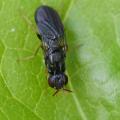



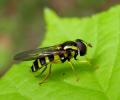
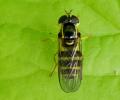

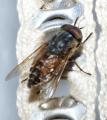
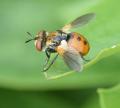


 but don't see the image in the post.
but don't see the image in the post.
